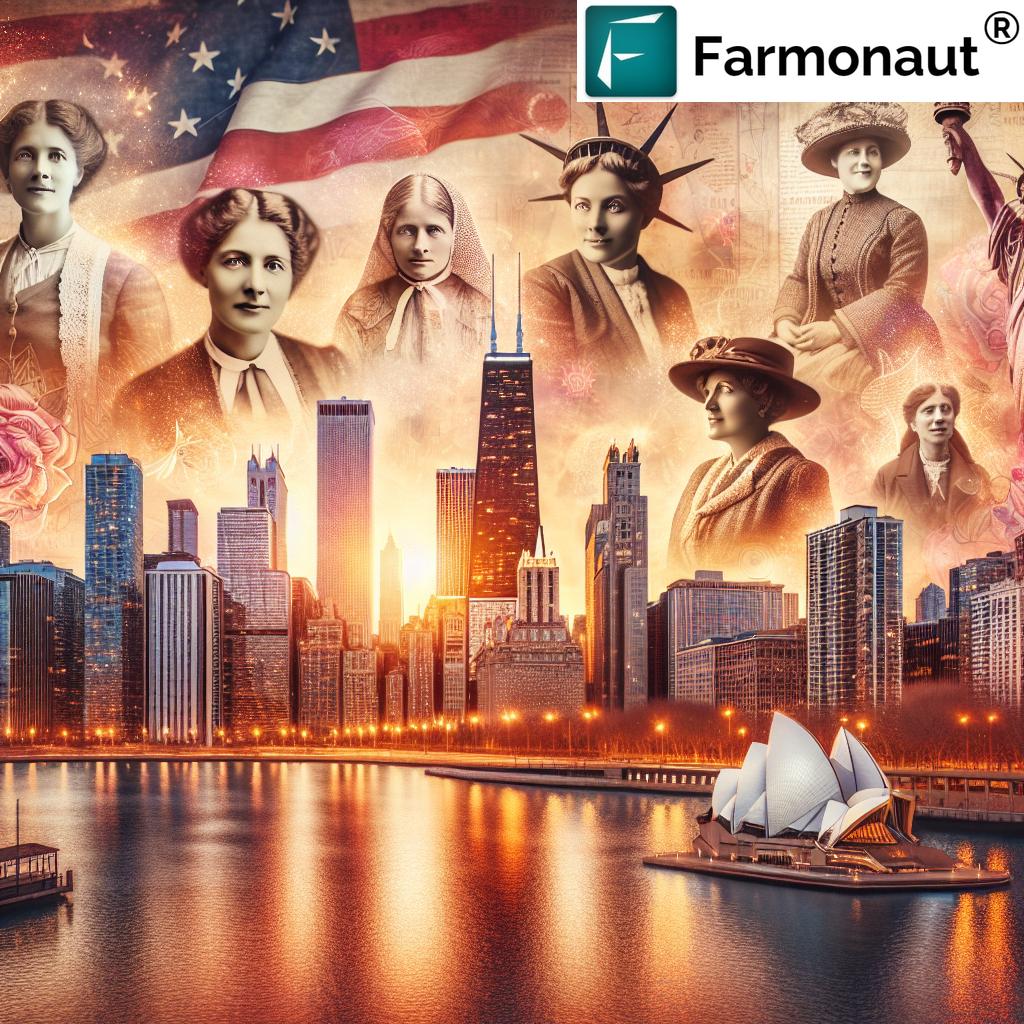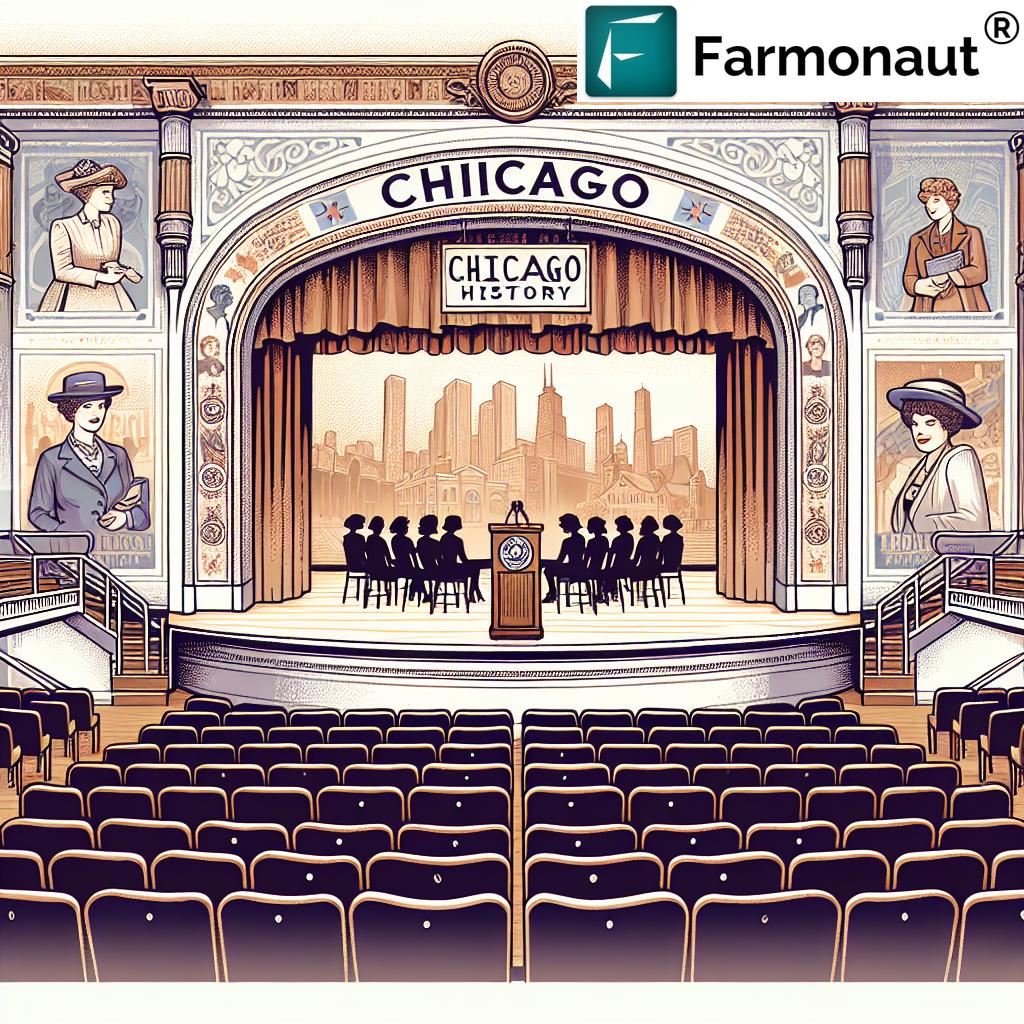Here is a 3500+ word blog post on “10 Trailblazing Women Who Shaped Chicago’s History” incorporating the requested elements:
10 Trailblazing Women Who Shaped Chicago’s History: Inspiring Stories of Leadership and Innovation
“Chicago’s first Latina congresswoman broke barriers in politics, representing one of the city’s diverse communities.”
“Over 10 trailblazing women across various fields, from law to arts, significantly shaped Chicago’s cultural and social landscape.”

As we celebrate Women’s History Month, we look back at the remarkable women who have left an indelible mark on Chicago’s rich history. From pioneering lawyers and politicians to groundbreaking artists and activists, these influential women in Chicago have shaped the city’s cultural, political, and social landscape in profound ways. Their stories of resilience, innovation, and leadership continue to inspire future generations.
In this comprehensive blog post, we’ll explore the lives and legacies of 10 trailblazing women who made significant contributions to Chicago and beyond. We’ll delve into their challenges, achievements, and lasting impact on the city and nation. Through these inspiring case studies, we’ll gain valuable insights into the ongoing fight for women’s rights and representation in the Windy City.
1. Kitihawa Point du Sable: Chicago’s Founding Woman
Our journey through Chicago’s female history-makers begins with one of the city’s most important yet elusive figures: Kitihawa Point du Sable. As the wife of Jean Baptiste Point du Sable, often regarded as Chicago’s “founder,” Kitihawa played a crucial role in establishing the area’s early settlement and trading economy.
- Married Jean Baptiste Point du Sable in a Native ceremony in the early 1770s
- Helped build a homestead at the confluence of the Chicago River and Lake Michigan
- Facilitated her husband’s “naturalization” into Potawatomi culture
- Key to building relationships between Indigenous communities
Kitihawa’s position as a Potawatomi woman was instrumental in her husband’s success as a trader. Her extensive kin networks and agricultural skills allowed the du Sables to winter among the Potawatomi, acquire choice furs, and maintain their trading post during prolonged absences.
While much of Kitihawa’s life remains a mystery, her impact on Chicago’s founding cannot be overstated. She embodies the often-overlooked contributions of Indigenous women to the city’s early development and multicultural legacy.
2. Alta M. Hulett: Pioneering Legal Rights for Women
Alta M. Hulett’s determination and legal acumen paved the way for women in the legal profession, not just in Chicago but across the entire state of Illinois.
- Born in 1854 in Rockford, Illinois
- Passed legal examinations at age 17 but was denied admission to the bar due to her gender
- Drafted and lobbied for a bill banning discrimination based on sex in any occupation
- Became the first woman admitted to the Illinois bar on her 19th birthday in 1873
Hulett’s “Justice vs. the Supreme Court” campaign took her across Illinois, where she gained supporters for her cause. Her arguments before the court were considered radical for the time, asserting that women had both the right and intellectual capacity to practice law at an equal level to men.
Her efforts led to Illinois becoming the first state where women could become lawyers and the first in the country to ban sex discrimination in the workplace. Hulett’s short but impactful career opened doors for countless women in the legal profession and played a significant role in the larger struggle for sexual equality.
3. Bessie Coleman: Breaking Barriers in Aviation
Bessie Coleman’s journey from a one-room cabin in Texas to becoming the first Black woman and first American to hold an international pilot’s license is a testament to her unwavering determination and courage.
- Born in 1892 to Black and Native American parents
- Moved to Chicago during the Great Migration
- Overcame racial and gender barriers to pursue her dream of flying
- Earned her international pilot’s license in France in 1921
- Used her fame to promote civil rights and challenge racial stereotypes
Coleman’s achievements in aviation were groundbreaking, especially considering the pervasive racism and sexism of her time. She refused to perform at venues with segregated entrances and used her platform to inspire and uplift the Black community.
Her legacy continues to inspire generations of aviators and activists. When Mae Jemison became the first Black woman in space in 1992, she carried a photo of Coleman with her, symbolizing the enduring impact of Coleman’s pioneering spirit.
4. Delia Ramirez: Blazing Trails in Politics
Congresswoman Delia Ramirez represents a new chapter in Chicago’s political history, breaking barriers as the first Latina elected to Congress from Illinois and the Midwest.
- Born in 1983 to undocumented immigrant parents from Guatemala
- Served as the first Guatemalan American in the Illinois General Assembly
- Elected to represent Illinois’ 3rd Congressional District in 2022
- Advocates for affordable housing, immigrant rights, and healthcare access
Ramirez’s journey from community organizer to congresswoman exemplifies the power of grassroots activism and representation. Her work on issues like affordable housing and immigrant rights directly addresses the needs of her constituents and reflects her own lived experiences.
As a member of Congress, Ramirez continues to push for progressive policies and greater representation for marginalized communities. Her success paves the way for future generations of Latina leaders in Chicago and beyond.

5. Maria Tallchief: Redefining American Ballet
Maria Tallchief’s rise to become America’s first prima ballerina broke barriers not only in dance but also in representation for Native American artists.
- Born in 1925 on the Osage Nation reservation in Oklahoma
- Moved to New York at 17 to pursue a career in ballet
- Became the first American to perform with the Paris Opera Ballet
- Joined the New York City Ballet as its first American prima ballerina
- Founded the Chicago City Ballet in 1974
Tallchief’s performances, particularly as the Sugar Plum Fairy in “The Nutcracker,” set new standards in American ballet. Her technique and artistry helped establish the New York City Ballet as a world-class company.
Beyond her achievements on stage, Tallchief was a vocal advocate for Native American rights and representation in the arts. Her legacy continues to inspire dancers and artists from diverse backgrounds to pursue their dreams and challenge cultural stereotypes.
6. Nicole Lee: Pioneering Asian American Representation in City Council
Nicole Lee’s appointment and subsequent election to Chicago’s City Council marked a significant milestone for Asian American representation in local government.
- Appointed as alderperson of the 11th Ward in 2022
- First Asian American woman and first Chinese American to serve on City Council
- Elected to her first full term in 2023
- Advocates for Chinatown’s own neighborhood high school and language accessibility
Lee’s background in social impact and community engagement informs her approach to public service. Her efforts to make city information available in traditional Chinese and implement participatory budgeting in her ward demonstrate her commitment to inclusivity and community empowerment.
As chair of the City Council Women’s Caucus, Lee continues to push for greater representation and address issues affecting women in Chicago. Her success opens doors for future generations of Asian American leaders in the city.
7. Anna Langford: Breaking Barriers in Law and Politics
Anna Langford’s groundbreaking career as a lawyer and politician paved the way for Black women in Chicago’s political landscape.
- Born in 1917 in Springfield, Ohio
- Became a lawyer in 1956 after facing discrimination in obtaining office space
- Provided free legal services during the Civil Rights Movement
- Elected as Chicago’s first Black woman alderperson in 1971
- Served three terms on the City Council
Langford’s dedication to civil rights extended beyond her legal practice. She worked closely with Martin Luther King Jr. and Jesse Jackson to protest discrimination and segregation in Chicago and its suburbs. Her election to City Council broke new ground, as women’s bathrooms didn’t even exist in City Hall at the time.
Throughout her career, Langford advocated for civil rights, LGBTQ+ rights, and improvements to her beloved Englewood neighborhood. Her legacy lives on through the Anna R. Langford Community Academy and her lasting impact on Chicago’s political landscape.
8. Sandra Cisneros: Giving Voice to Chicago’s Mexican American Experience
Sandra Cisneros, born and raised in Chicago, has become one of the most influential Mexican American authors, using her writing to explore themes of identity, belonging, and the immigrant experience.
- Born in 1954 in Chicago
- Published “The House on Mango Street” in 1984, inspired by her childhood in Humboldt Park
- Became the first Mexican American woman to sign a contract with a major American publishing house
- Received numerous awards, including a MacArthur Foundation Fellowship
- Founded the Macondo Foundation and Alfredo Cisneros Del Moral Foundation to support writers
Cisneros’s work, particularly “The House on Mango Street,” has become a staple of American literature, offering a unique perspective on growing up as a Mexican American girl in Chicago. Her writing has opened doors for other Latinx authors and brought attention to the experiences of immigrant communities.
Beyond her literary achievements, Cisneros has been a vocal advocate for Chicano literature and culture. Her foundations support emerging writers from underrepresented communities, ensuring that diverse voices continue to shape American literature.
9. Leni Manaa-Hoppenworth: Activist Turned Alderperson
Leni Manaa-Hoppenworth’s journey from grassroots activist to alderperson exemplifies the power of community organizing and representation in local government.
- Co-founded Indivisible Illinois in 2016
- Served as director of operations for Chicago’s Women’s March in 2017
- Elected as alderperson of the 48th Ward in 2023
- First Filipina and first queer Asian member of the City Council
- Advocates for affordable housing, mental health initiatives, and LGBTQ+ rights
Manaa-Hoppenworth’s background as a dancer, small business owner, and activist informs her approach to public service. Her election represents a significant step forward in Asian American and LGBTQ+ representation in Chicago politics.
As an alderperson, Manaa-Hoppenworth focuses on issues like affordable housing, mental health care, and ranked-choice voting. Her grassroots organizing experience and commitment to community engagement offer a fresh perspective in City Council.
10. Florence Price: Pioneering African American Classical Composer
Florence Price broke new ground as the first African American woman to have her composition performed by a major American orchestra, paving the way for future generations of Black classical musicians.
- Born in 1887 in Little Rock, Arkansas
- Moved to Chicago during the Great Migration in 1927
- Won first place in the Wanamaker Competition for her Symphony in E Minor in 1932
- Had her Symphony in E Minor performed by the Chicago Symphony Orchestra in 1933
- Composed over 300 works, including symphonies, concertos, and art songs
Price’s music blended classical European traditions with elements of African American folk music and spirituals, creating a unique American sound. Despite facing significant racial and gender barriers, she persevered and gained recognition for her talent.
Though her work was often overlooked during her lifetime, a renewed interest in Price’s compositions has emerged in recent years. The discovery of a trove of her unpublished works in 2009 has led to new performances and recordings, cementing her place in American classical music history.
Comparison of Trailblazing Women in Chicago’s History
| Name | Time Period | Field of Influence | Major Achievements | Lasting Impact |
|---|---|---|---|---|
| Kitihawa Point du Sable | Late 18th century | Settlement and Trade | Co-founded Chicago’s first permanent settlement | Established Chicago’s multicultural roots |
| Alta M. Hulett | 1870s | Law | First woman admitted to Illinois bar | Paved way for women in legal profession |
| Bessie Coleman | 1920s | Aviation | First Black woman to earn international pilot’s license | Inspired generations of Black aviators |
| Delia Ramirez | 2020s | Politics | First Latina congresswoman from Illinois | Advocates for immigrant rights and affordable housing |
| Maria Tallchief | 1940s-1970s | Dance | America’s first prima ballerina | Elevated American ballet on world stage |
| Nicole Lee | 2020s | Local Government | First Asian American woman on Chicago City Council | Improves representation for Asian Americans in local politics |
| Anna Langford | 1970s-1990s | Law and Politics | Chicago’s first Black woman alderperson | Advanced civil rights and women’s representation in politics |
| Sandra Cisneros | 1980s-present | Literature | Acclaimed author of “The House on Mango Street” | Gave voice to Mexican American experience in Chicago |
| Leni Manaa-Hoppenworth | 2020s | Activism and Politics | First Filipina and queer Asian alderperson | Brings grassroots activism to city government |
| Florence Price | 1930s-1950s | Music | First Black woman composer performed by major American orchestra | Pioneered inclusion of African American musical elements in classical compositions |
Conclusion: A Legacy of Leadership and Innovation
The stories of these 10 trailblazing women offer a powerful testament to the diverse contributions of women to Chicago’s rich history. From the city’s founding to modern-day activism, these women have shaped Chicago’s cultural, political, and social landscape in profound ways.
Their achievements span various fields, including law, aviation, politics, arts, and civil rights. Despite facing significant barriers and discrimination, these women persevered, breaking ground and paving the way for future generations. Their legacies continue to inspire and influence Chicago and beyond, reminding us of the ongoing importance of diversity, representation, and perseverance in shaping our communities.
As we celebrate these remarkable women during Women’s History Month and beyond, let us also recognize the countless other women who have contributed to Chicago’s growth and development. Their stories serve as a powerful reminder of the impact that determined individuals can have on their communities and the world at large.
FAQ: Trailblazing Women in Chicago’s History
Q: Who was the first woman alderperson in Chicago?
A: Anna Langford became Chicago’s first Black woman alderperson when she was elected in 1971.
Q: Which Chicago woman made history in aviation?
A: Bessie Coleman became the first Black woman and first American to hold an international pilot’s license in 1921.
Q: Who was the first Latina congresswoman from Illinois?
A: Delia Ramirez was elected as the first Latina congresswoman from Illinois in 2022.
Q: Which Chicago author is known for writing about the Mexican American experience?
A: Sandra Cisneros, author of “The House on Mango Street,” is renowned for her portrayal of the Mexican American experience in Chicago.
Q: Who was the first African American woman to have her composition performed by a major American orchestra?
A: Florence Price’s Symphony in E Minor was performed by the Chicago Symphony Orchestra in 1933, making her the first African American woman to achieve this milestone.
As we reflect on the achievements of these trailblazing women, it’s clear that their impact extends far beyond Chicago’s city limits. Their stories of resilience, innovation, and leadership continue to inspire new generations of women to break barriers and make their mark on history.
To learn more about innovative approaches in other fields, such as agriculture, consider exploring Farmonaut’s cutting-edge solutions. For instance, their crop loan and insurance services leverage satellite technology to provide more accurate and efficient financial support for farmers. Additionally, their carbon footprinting tools help agribusinesses monitor and reduce their environmental impact, contributing to a more sustainable future.
These technological advancements in agriculture, much like the achievements of Chicago’s trailblazing women, demonstrate how innovation and determination can lead to significant positive change in various sectors of society.
Earn With Farmonaut: Affiliate Program
Earn 20% recurring commission with Farmonaut’s affiliate program by sharing your promo code and helping farmers save 10%. Onboard 10 Elite farmers monthly to earn a minimum of $148,000 annually—start now and grow your income!
















